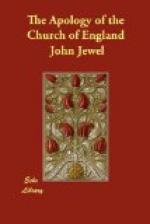But peradventure they will say, it was treason to attempt these matters without a sacred general council; for in that consisteth the whole force of the Church; there Christ hath promised He will ever be a present assistant. Yet they themselves, without tarrying for any general council, have broken the commandments of God, and the decrees of the Apostles; and, as we said a little above, they have spoiled and disannulled almost all, not only ordinances, but even the doctrine of the primitive Church. And where they say it is not lawful to make a change without a council, what was he that gave us these laws, or from whence had they this injunction?
Truly, King Agesilaus did but fondly, who, when he had a determinate answer made him of the opinion and will of mighty Jupiter, would afterward bring the whole matter before Apollo, to know whether he would allow thereof, as his father Jupiter did, or no. But yet should we do much more fondly, when we hear God Himself plainly speak to us in His most Holy Scriptures, and may understand by them His will and meaning, if we would afterward (as though this were of none effect) bring our whole cause to be tried by a council; which were nothing else but to ask whether men would allow as God did, and whether men would confirm God’s commandment by their authority.
Why, I beseech you, except a council will and command, shall not truth be truth, and God be God? If Christ had meant to do so from the beginning, as that He would preach or teach nothing without the bishop’s consent, but refer all His doctrine over to Annas and Caiaphas, where should now have been the Christian faith? or, who at any time should have heard the Gospel taught? Peter verily, whom the Pope hath oftener in his mouth, and more reverently useth to speak of than he doth of Jesus Christ, did boldly stand against the holy council, saying, “It is better to obey God than men.” And after Paul had once entirely embraced the Gospel, and had received it, “not from men, nor by man, but by the only will of God, he did not take advice therein of flesh and blood,” nor brought the case before his kinsmen and brethren, but went forthwith into Arabia, to preach God’s Divine mysteries by God’s only authority.
Yet truly, we do not despise councils, assemblies, and conference of bishops and learned men; neither have we done that we have done altogether without bishops or without a council. The matter hath been treated in open Parliament with long consultation, and before a notable synod and convocation. But touching this council which is now summoned by the Pope Pius, wherein men so lightly are condemned, which have been neither called, heard, nor seen, it is easy to guess what we may look for or hope of it.




